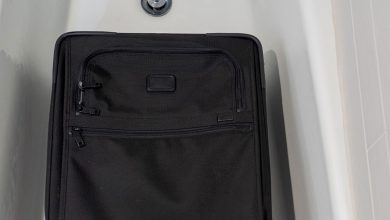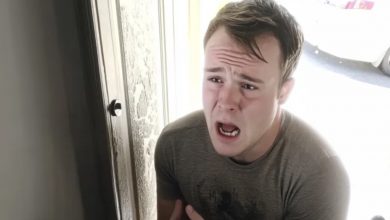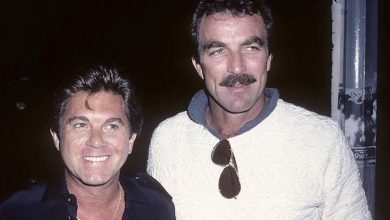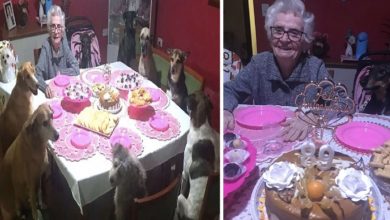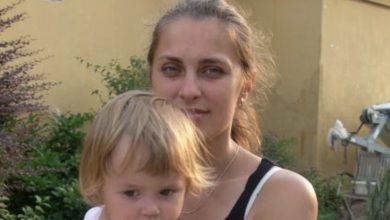“A Hidden Bruise, a Yacht, and a Secret File: How One Daughter Brought Down a Family Empire”
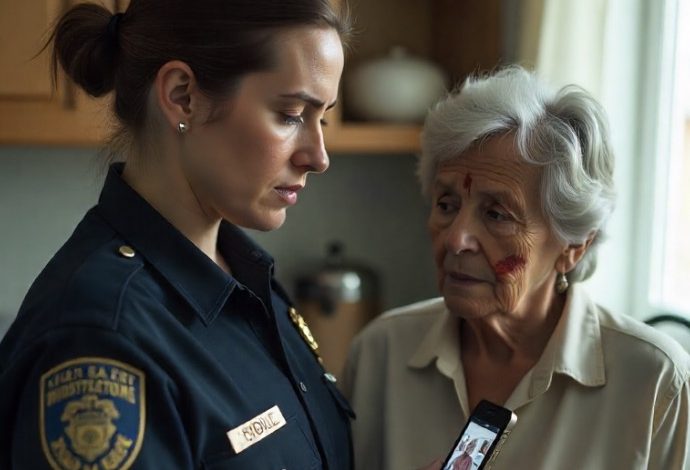
I came home without telling anyone, expecting nothing more than a cup of coffee and a short visit. Instead, I walked straight into the moment that split my life into a before and an after.
My mother was standing in the kitchen. At first glance, everything looked ordinary—the pale yellow curtains I had known since childhood, the faint smell of lemon dish soap clinging to the air, the sound of running water as she washed a mug. But then I saw it. A bruise, raw and dark, blooming across her cheekbone. She had tried to cover it with powder, but makeup could not erase the truth.
That sight hollowed me out.
“Mom…” My voice broke before I could finish. “What happened to your face?”
She turned slightly, her hand brushing her cheek as if she could hide the mark just by touching it. Her smile was too soft, too rehearsed. “Oh, nothing, Claire. I slipped while cleaning the upstairs window. You know how clumsy I can be.”
It was the same gentle excuse I’d heard my whole life. When doors slammed, when dishes shattered, when dents appeared in walls only to be painted over the next day—she always had an explanation. My father, Richard Donovan, never needed to raise his hand in public. My mother’s silence did that work for him.
I wanted to scream, but the words died in my throat.
Then, as if fate wanted to carve the wound deeper, my phone buzzed. A text from an unknown number. I opened it and nearly dropped the phone.
It was a photo of my father, Richard, sun-kissed and grinning, holding up a champagne glass on a gleaming yacht called Legacy. At his side was Elise Moore, his elegant business partner, draped in red silk, her smile confident, her hand resting possessively on his arm. The caption read: Legacy has its perks.
The air left my chest. Without a word, I showed the screen to my mother. She didn’t flinch, didn’t weep, didn’t even blink. Her hands shook so violently as she rinsed the mug that I thought it might shatter in her grasp.
That silence, heavier than any argument, told me more than words ever could.
I walked upstairs to my old room. It still carried ghosts of childhood—the faded wallpaper, the narrow bed, the closet in the corner. In that closet sat a small fireproof safe. My fingers knew the code by heart: my badge number. With a click, it opened. Inside lay my silver police badge and a thick envelope sealed with wax.
That envelope contained everything I had once gathered: reports of safety violations at my father’s construction company, copies of quiet settlement checks handed to injured workers, anonymous letters that whispered about bribes. I had promised myself I would never open it again. But promises don’t matter when truth is staring you in the face.
I picked up the badge, feeling the cool weight in my palm. It wasn’t just metal. It was proof that I was not a powerless child anymore. I was Claire Donovan, a detective, and I had tools my father could no longer silence.
Back downstairs, my mother was still at the sink, her back curved like the weight of decades rested on her shoulders. Without turning, she whispered, “Don’t stir anything up, Claire. Please. For me.”
Her voice trembled. Mine did not. I kissed her temple, stepped outside into the scorching Texas air, and dialed Henry Caldwell—my lawyer, and the only man I trusted with what I was about to unleash.
“Henry,” I said when he answered, my voice steady and cold. “It’s time.”
There was a pause. Then his tone sharpened. “The Rainy Day file?”
“Yes. Burn it all down.”
The weeks that followed were a blur of headlines, whispered rumors, and half-truths. My father’s influence spread fast. Suddenly, I was no longer Detective Donovan. I was the “bitter daughter” on the evening news, accused of chasing ghosts and dragging a respected businessman’s name through the mud.
But ghosts don’t freeze bank accounts. Ghosts don’t produce falsified invoices and offshore transfers. Paper does.
In Henry’s oak-paneled office, subpoenas lay across his desk like weapons. “These are the cracks,” he told me. “Banking records, commission reports, shell corporations tied to Elise Moore. If your father thinks this is just family drama, he’s already three steps behind.”
Each piece of paper was another nail hammered into the coffin of Richard Donovan’s empire.
Still, my father fought back. He filed a formal complaint against me with the department—misuse of resources, conflict of interest. Internal Affairs opened an investigation. He wanted to turn my own badge into a blade against me.
That night, he left me a voicemail. His voice was soft, polished, the way he spoke at galas and fundraisers. “Sweetheart, you don’t have to do this. This isn’t who you are.” Then it turned sharp, venomous. “You’re embarrassing your mother. You’re making a mess you can’t clean up. You will regret this.”
I saved the voicemail and sent it to Henry’s encrypted files. Another nail in the box.
The real turning point came in a dingy Houston coffee shop. A man named Frank Delaney slid into the booth across from me. His suit was old, his eyes tired, but steady. He handed me a worn envelope.
“Your father built empires out of shortcuts,” he rasped. “And some of us carried the weight of the bodies.”
Inside were falsified invoices, bribe receipts, and photos of a scaffold accident—men broken by negligence, silenced by money.
“Why now?” I asked.
“Because silence never made me clean,” he said. “And you shouldn’t have to carry this alone.”
His words cracked something open inside me.
Soon after, Linda Perez, a former clerk at Donovan Construction, called me in tears. She spoke of cash envelopes for inspectors, of dates she’d written in her Bible as proof. She feared my father, but fear no longer outweighed her need for truth.
With every testimony, every scrap of paper, the walls of Richard Donovan’s empire began to crumble.
The final blow came at the annual shareholders’ meeting in the grand ballroom of the Houston Hotel. Chandeliers glowed above polished marble as my father stood tall at the podium, Elise by his side, his voice booming about vision, family, and legacy.
Then Henry cued the first slide. Offshore accounts. Fake property transfers. Then the photo of my father on the yacht beside Elise. And finally—my mother’s bruised face, dated, signed by a physician.
The crowd gasped. Elise’s porcelain mask cracked.
“You think you can destroy me?” my father roared, slamming his fist on the podium.
I stood tall. “No, Dad. You destroyed yourself.”
The DA’s observer rose calmly from her seat. “Our office confirms an active investigation into corporate fraud and endangerment.”
In that moment, Elise slipped from my father’s side, whispering frantically to the DA. She was flipping, abandoning the man she once stood beside.
Months later, the courtroom smelled of varnish and old coats. My father sat smaller than I’d ever seen him, his suit ill-fitting, his confidence gone. The clerk read the charges: fraud, laundering, endangerment. He answered “guilty” to each, his eyes fixed on the table.
When the judge asked if any victim wished to speak, my mother stood. No makeup, no armor, just a steady voice.
“I am not here to punish,” she said. “I am here to make sure the harm ends with us.”
It wasn’t triumph. It was closure.
The restitution was enough to build something good out of ruins. Henry and I helped my mother start The Begin Again Fund—small grants for women escaping abusive homes. Money for first month’s rent, new locks, bus tickets. A first step toward safety.
We moved her into a small cottage in Galveston. The kitchen smelled of lemon soap, but now it was gentle, not suffocating. She washed dishes with the window open, sunlight spilling in, not silence.
A letter arrived from the federal facility where my father would spend his years. Pages of excuses, blaming me for his fall. I folded it, placed it in a drawer, and let it stay there, powerless.
That night, I typed a post for a small blog I had started:
My name is Claire Donovan. For years, silence ruled my home. It was used to hide pain and control lives. If any of this feels familiar to you, know this—doors can open. Help can be quiet, but it is real. Your voice matters. And when you are ready, we will keep a light on for you.
Now, the sound I hear isn’t a mug shaking in trembling hands. It’s the sea outside my mother’s cottage, and the laughter of two women planting tomato seedlings under the sun—finally free.

